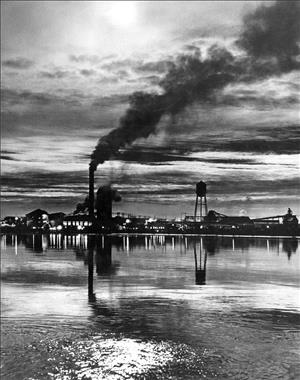On April 8, 1903, the newly formed Weyerhaeuser Timber Company, with offices in Tacoma, opens its first sawmill in Washington state in Everett, beginning a Weyerhaeuser presence in the city that will last until 1992. The mill is located on Port Gardner Bay, on the sites of the Bell-Nelson mill and adjoining Everett Shipbuilding Company.
A Profitable Partnership
The person most responsible for making Everett a mill town was James J. Hill (1838-1916), president of the Great Northern Railway and majority owner of the Northern Pacific. In 1899 he purchased the remaining holdings of the failed Everett Land Company, changing its name to the Everett Improvement Company and hiring city planner John McChesney (d. 1922) to run it. McChesney had experience as a banker, former mayor of Aberdeen, South Dakota, and head of a syndicate that developed Chattanooga, Tennessee.
Offering sites at bargain prices, the Improvement Company by 1910 had added large and small lumber and shingle mills, a brewery, a flour mill, a shoe factory, a creamery, a stove works, a granary, an additional iron works, and three shipbuilding plants. It also built the Everett Theater and a bank.
Hill closed a deal with timberman Frederick Weyerhaeuser (1834-1914), who sought to expand his timber holdings by purchasing land in the Pacific Northwest. On January 3, 1900, Hill sold 900,000 acres of Northern Pacific land in Washington to Weyerhaeuser, who then organized the Weyerhaeuser Timber Company, with himself as president.
Healing Wounds
In August 1902, Hill spoke to Everett businessmen, offering new promises. In the 1890s, Hill's promise of bringing the Great Northern Railway to Everett persuaded wealthy capitalists to invest in the new city. The railroad did arrive in 1893, but by that time Seattle and Tacoma already had rail service and the associated economic head start. Following a national recession in 1893, many wealthy investors, including John D. Rockefeller (1939-1937) and partners, looked for better prospects, packed their bags and left town, leaving Everett to deal with the wreckage.
The national economy was good in 1902 and Everett businessmen were open to Hill's new promises. These included what Hill described as a "commodious depot" with added track and two large Weyerhaeuser mills, the latter an investment of $1 million that was expected to employ 800 men and increase city population to 8,000 ("Hill is Alright ...").
Hill's plan was to encourage new industries that would build the Everett economy by bringing local products to East Coast and Asian markets. In Hill's words: "Look what Everett has done in the last two years, doubled its population and increased wonderfully in wealth and new industries. Your people are employed and your mills are running and permanent and substantial prosperity is with you ... Our ships will not pay us but they will bring us freight to fill our empty eastbound cars, and there we will make a profit" ("Hill is Alright ...").
A Modern Experimental Mill
On December 29, 1901, the Weyerhaeuser syndicate announced it had purchased, at a price of $280,000, the Bell-Nelson Mill on Port Gardner Bay, the adjoining Everett Shipbuilding Company, and a Bell-Nelson logging camp at Maple Valley. Owners James Bell and Oscar Nelson closed the mill for two weeks to begin refurbishing the facility, but it was soon decided that a new, modern facility would be built to replace it. Contractors determined that the existing shipbuilding foundation could be used and incorporated. Phasing out its operations at the site, the Everett Shipyards launched its last boat, the steamer Albion, in 1902.
A Longtime Industry for Everett
The first mill established a Weyerhaeuser presence in Everett that lasted for decades: Mill A (1903-1980) was a showcase, experimental mill on Port Gardner Bay; Mill B (1915-1979) was the first electric mill in the U.S. and supplier to East Coast markets, located on the Snohomish River at the northern tip of Everett; Mill C (1923-1977) was a hemlock plant lying east of Mill B; the Kraft Pulp Mill (1953-1992) and Mill E (1971-1985) were on the Snohomish River, east of Mill B.
An elegant office building that was built at Mill A to showcase its products in 1923 currently [2021] is owned by the Port of Everett and is located at the Port's Boxcar Park. Following the closure of its last mill, Weyerhaeuser stayed in Everett years longer doing environmental cleanup at its plant sites.

